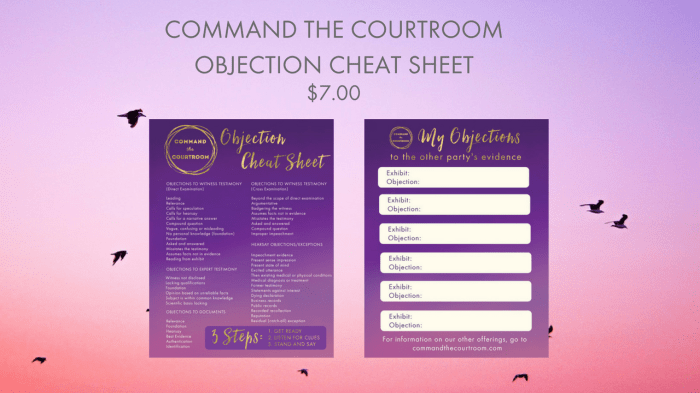Prepare to elevate your mock trial prowess with our comprehensive Mock Trial Objections Cheat Sheet. This invaluable resource empowers you with the knowledge and strategies to master the art of objections, ensuring you dominate the courtroom with confidence and precision.
Delve into the intricacies of objection grounds, timing, and procedures, arming yourself with the tools to effectively challenge inadmissible evidence and protect your client’s interests. This cheat sheet serves as your ultimate guide to navigating the complexities of mock trial objections, transforming you into a formidable advocate.
1. Mock Trial Objections
An Overview

In a mock trial setting, objections are formal challenges raised by attorneys to prevent the introduction of inadmissible evidence or testimony. These objections aim to ensure the fairness and accuracy of the proceedings by upholding the rules of evidence.
Objections play a crucial role in preserving the integrity of the trial process. They help exclude irrelevant, prejudicial, or unreliable evidence that could potentially sway the jury’s decision. By raising objections, attorneys protect their clients’ rights and promote a just and impartial trial.
Common objections include those based on relevance, hearsay, leading questions, and privilege. Attorneys must be well-versed in the grounds for objections and the proper procedures for raising them effectively.
2. Grounds for Objections: Mock Trial Objections Cheat Sheet
Relevance
Relevance objections challenge the admissibility of evidence that is not logically connected to the facts in dispute. Irrelevant evidence can confuse the jury and waste time.
Example:In a murder trial, the prosecution seeks to introduce evidence that the defendant had a violent temper. The defense objects on the grounds of relevance, arguing that the defendant’s temper is not relevant to whether they committed the murder.
Hearsay
Hearsay objections target out-of-court statements offered for the truth of the matter asserted. Hearsay is generally inadmissible because it is unreliable and subject to manipulation.
Example:A witness testifies that they heard the defendant say, “I killed John.” The defense objects on the grounds of hearsay, arguing that the witness’s testimony is not admissible because it is based on an out-of-court statement.
Leading Questions, Mock trial objections cheat sheet
Leading questions suggest the desired answer to the witness, potentially influencing their testimony. Leading questions are generally not allowed on direct examination, as they can create a false impression of the witness’s independent recollection.
Example:The prosecutor asks a witness, “Did the defendant hit you?” The defense objects on the grounds of leading, arguing that the question suggests the answer and influences the witness’s testimony.
Privilege
Privilege objections protect certain types of communications from disclosure. Privileged communications include those between attorney and client, doctor and patient, and priest and penitent.
Example:In a criminal trial, the prosecution seeks to introduce a conversation between the defendant and their attorney. The defense objects on the grounds of attorney-client privilege, arguing that the conversation is protected from disclosure.
User Queries
What are the common grounds for objections in mock trials?
Common grounds for objections include relevance, hearsay, leading questions, and privilege.
When should objections be raised in a mock trial?
Objections should be raised as soon as the grounds for the objection become apparent.
What are the consequences of sustaining or overruling an objection?
Sustaining an objection prevents the introduction of inadmissible evidence, while overruling an objection allows the evidence to be admitted.